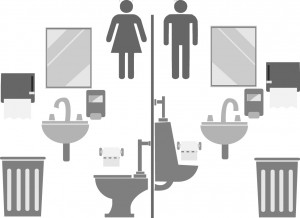Sanitation: All Part of Our Business
MOOR graphic by LESLIE HWANG
JASON ZHU
Staff Writer
What comes to mind when you hear the words “school restroom?” Dirty floors? Unflushed toilets? Clogged drains? A column in the Coppell High School newspaper, The Sidekick, even claims that “[walking] into one of the school restrooms is similar to walking onto a crime scene: the smell is overwhelming and you always fear what is lingering behind closed doors.” Indeed, the unsanitary conditions of school restrooms have been a prolonged problem.
Before we start to point fingers at our maintenance staffs for “not cleaning properly,” we should realize that we are just as much as to blame if not entirely responsible. Often times it is the students’ indifference and thoughtless actions that make our school restrooms what they are today. The custodians plumb toilets, mop floors and clean stalls, yet many of us cannot even comply with the courtesy of flushing, let alone keeping the floors dry or making sure used paper towels go into the trash bin.
Sanitation might seem like an insignificant issue, but it is directly related to the social and economic status of a country. A study conducted by the World Health Organization shows that India and West Africa suffer an additional dropout rate of 25 percent among female students due to underdeveloped sanitary facilities. This drastically hinders their education on top of the ravaging diseases in these regions.
To countries plagued by poverty, sanitation is a privilege. Therefore, we should not take the restrooms that we have at school for granted. More of us need to remember to give a little tap to the trigger and flush the toilet every time, more of us need to stop smashing the faucet like some game show buzzer, more of us need to care more about each other and only then can we improve the condition of our restrooms. If we want to have a better experience when we need to do our business, then it is our responsibility to start taking sanitation issues into our own hands.
